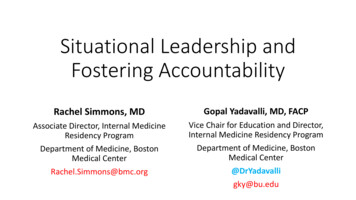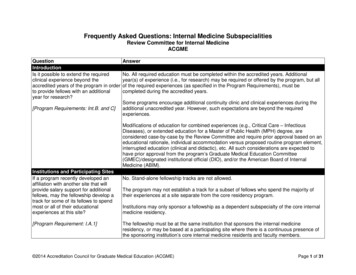
Transcription
Frequently Asked Questions: Internal Medicine SubspecialitiesReview Committee for Internal MedicineACGMEQuestionIntroductionIs it possible to extend the requiredclinical experience beyond theaccredited years of the program in orderto provide fellows with an additionalyear for research?[Program Requirements: Int.B. and C]AnswerNo. All required education must be completed within the accredited years. Additionalyear(s) of experience (i.e., for research) may be required or offered by the program, but allof the required experiences (as specified in the Program Requirements), must becompleted during the accredited years.Some programs encourage additional continuity clinic and clinical experiences during theadditional unaccredited year. However, such expectations are beyond the requiredexperiences.Modifications of education for combined experiences (e.g., Critical Care – InfectiousDiseases), or extended education for a Master of Public Health (MPH) degree, areconsidered case-by-case by the Review Committee and require prior approval based on aneducational rationale, individual accommodation versus proposed routine program element,interrupted education (clinical and didactic), etc. All such considerations are expected tohave prior approval from the program’s Graduate Medical Education Committee(GMEC)/designated institutional official (DIO), and/or the American Board of InternalMedicine (ABIM).Institutions and Participating SitesIf a program recently developed anaffiliation with another site that willprovide salary support for additionalfellows, may the fellowship develop atrack for some of its fellows to spendmost or all of their educationalexperiences at this site?[Program Requirement: I.A.1]No. Stand-alone fellowship tracks are not allowed.The program may not establish a track for a subset of fellows who spend the majority oftheir experiences at a site separate from the core residency program.Institutions may only sponsor a fellowship as a dependent subspecialty of the core internalmedicine residency.The fellowship must be at the same institution that sponsors the internal medicineresidency, or may be based at a participating site where there is a continuous presence ofthe sponsoring institution’s core internal medicine residents and faculty members. 2014 Accreditation Council for Graduate Medical Education (ACGME)Page 1 of 31
QuestionAnswerThe fellowship may develop affiliations and rotations at other participating sites, as long asthe fellows’ continuity experience is maintained as required by the relevant programrequirements for continuity clinic.The program director may excuse fellows from continuity clinic up to three non-consecutivemonths over a three-year fellowship, two non-consecutive months over a two-yearfellowship, or one month for a one-year fellowship.What portion of the program director’s The program director has many administrative responsibilities regardless of the size of thesalary should be provided by theprogram. These include: developing and implementing the curriculum; planning andinstitution if it is a small program (e.g., a coordinating didactic conferences; evaluating the fellows/faculty members/program; givingprogram with three fellows)?feedback to fellows and faculty members; selecting faculty members for teachingassignments; conducting semi-annual reviews; preparing the program information form[Program Requirement: I.A.2.b).(2)](PIF); implementing the competencies; and more. The Review Committee expects that thateach program director will be provided with adequate time to fulfill these administrativeresponsibilities.What are the Review Committee’sexpectations for programs withparticipating sites that aregeographically distant or remotelylocated from the primary clinical site?[Program Requirement: I.B.2]Programs will be cited if the program director judges that the salary support is inadequate tocover the time spent carrying out the administrative responsibilities of the fellowship, or ifthe program director needs to generate clinical income to cover the cost of thisadministrative time. Note that 25-50 percent of a program director’s salary is a range toaccount for the differences between small and large fellowship programs.The Review Committee considers a participating site remote if it requires extended travel(consistently more than one hour each way) or if the radius between the site and theprimary clinical site exceeds 60 miles. The Review Committee expects the following whenparticipating sites are remote:1. The program has provided appropriate educational rationale for the use of the remotesite in the ACGME’s Accreditation Data System (ADS).2. The program director has final authority over all aspects of education at the remotesite.3. If experiences at the remote site will be required experiences, this information willneed to be disclosed to all applicants prior to entering the program.4. No more than 25 percent of the educational experience can occur at remote sites.5. The program will need to ensure that fellows have housing available at the remote 2014 Accreditation Council for Graduate Medical Education (ACGME)Page 2 of 31
QuestionAnswersites, at no cost to the fellows.6. The program will need to establish a mechanism that allows:a) fellows to participate in conferences at the primary clinical site (electronically), ormake conferences with similar educational value available at the remote site;b) faculty members at the remote site to interact with faculty members at theprimary clinical site;c) fellows at the remote site to interact with other fellows at the primary clinical site;and,d) fellows to participate in interviews with the site visitor at the time of the program’sscheduled ACGME site visit. (July 2011 Review Committee meeting)*Program DirectorDoes the Review Committee allow coprogram directors?No, the Review Committee does not acknowledge co-program directors. The ReviewCommittee expects there to be one individual with the responsibility and authority for allaspects of the educational program.[Program Requirement: II.A.1]Programs may identify an associate program director (i.e., a program director-in-training)who participates heavily in the operation and administration of the program under thedirection of the program director. If an associate program director is identified, the ReviewCommittee expects that this individual has sufficient administrative time and resources todevote to the program.Does the Review Committee grantNo, the Review Committee does not grant waivers to this requirement. This is a “must”waivers to the program director if he or requirement because the Review Committee feels strongly that five years as an internalshe does not have at least five years of medicine fellowship faculty member in an ACGME-accredited fellowship is an importantparticipation as an active facultyprerequisite for taking on the role and responsibilities of program director. This experiencemember?allows individuals to gain fellowship and GME expertise, as well as institutional creditabilityto direct the fellowship and ensure compliance with the Program Requirements.[Program Requirement: II.A.3.a).(1)]Time spent in fellowship education does not count towards the five years of experience asan active faculty member. 2014 Accreditation Council for Graduate Medical Education (ACGME)Page 3 of 31
QuestionDoes the Review Committee grantwaivers for ABIM certification of theprogram director, if a program candemonstrate equivalent credentials?AnswerNo, the Review Committee does not grant waivers for ABIM certification for programdirectors. The Review Committee uses ABIM certification as one of its major outcomemeasures. A major goal and outcome of each fellowship has been the education of ABIMcertified graduates. ABIM-certified program directors demonstrate to the fellows the valueand importance of ABIM.[Program Requirement: II.A.3.b)]The Review Committee will propose withholding of accreditation for applications where theprogram director does not have current ABIM certification in the subspecialty.Can the Committee be more specificabout what it expects in regard to theprogram director’s responsibility,authority, and accountability for theoperation of the program?[Program Requirements: II.A.1.-II.A.4.v)]The program director may allow his or her core internal medicine certification to lapse, butmust maintain certification in the subspecialty.The Review Committee expects that the program director will have full responsibility and fullauthority for all aspects of the fellowship. This includes: The program director must monitor fellow experiences and exercise his or herauthority when the need arises (i.e., addressing fellow complaints about a facultymember, or determining that a rotation has insufficient educational value, etc.).The program director must have the authority to make all fellow assignments.The program director must have the authority to revise clinical rotations asnecessary to maintain fellow education.The program director must have the authority to remove fellows from services he orshe judges to have insufficient educational value.The program director must have the authority to deny admitting privileges to theinpatient fellowship teaching service for selected physicians who fail to support theprogram.The program director must have the authority to remove selected faculty members fromteaching assignments based on fellow evaluations or issues of faculty membercompetence/expertise. Authority may be shared (e.g., with the division chief), if the sameeffect can be demonstrated (i.e., resolution of problem faculty members, educationallymarginal rotations). 2014 Accreditation Council for Graduate Medical Education (ACGME)Page 4 of 31
QuestionAnswerDo the semi-annual evaluations ofThe program director must perform all semiannual reviews personally.fellow performance need to becompleted by the program director, orcan these be delegated to another KCFmember?[Program Requirement: II.A.4.g)]What will the Review Committee accept The Review Committee defers to programs and institutions the specifics of documentationas documentation of compliance withof compliance with duty hours requirements.the duty hours requirements?The Review Committee will rely on fellow reporting (i.e., the ACGME Resident and Fellow[Program Requirements: II.A.4.j)-k)]Survey, and the fellow interviews during the site visit) and review of fellow schedules in itsaccreditation decision regarding duty hours compliance.The Review Committee will consider additional information collected by the program (e.g.,duty hour logs, periodic surveys, etc.) in its determination of compliance.Programs may be asked to respond to concerns identified in the ACGME Resident andFellow Survey between site visits, and the Review Committee expects programs to be ableto document substantial compliance.What are examples of changes in theThe following are some examples of changes for which the program director must requestprogram for which the program director approval from the Review Committee:must request approval from the ReviewCommittee? Major disruptions in the institutional affiliation, governance, stability, etc. requireimmediate Review Committee notification via ADS.[Program Requirement: II.A.4.o).(2)] A major loss of program faculty (i.e., the program no longer meets the minimumnumber of KCF members as defined in the Program Requirements) requiresimmediate Review Committee notification as well as an update in ADS. Programs must request approval for all complement increases, even temporaryincreases (i.e., maternity leave extends a fellow’s education by three months suchthat when the fellow returns, the program is one over the limit). This is done in orderto ensure that the information in ADS is accurate. Complement changes are veryeasily accomplished using ADS. Programs will need to complete the “Response to 2014 Accreditation Council for Graduate Medical Education (ACGME)Page 5 of 31
QuestionAnswerCitations” in ADS prior to having a request for an increase in complementconsidered. Additionally, a request for an increase in complement will ask theprogram to provide documentation of adequate patient population, proceduralopportunities, staff, facilities, faculty, research opportunities, and an educationalrationale for the increase request. The Review Committee understands that residents beginning and graduating offcycle will occur frequently due to leaves of absence, remediation or visa delays. Inthese instances, a detailed educational rationale is not necessary. The program canbriefly explain the reason for the off-cycle resident(s) in the Educational Rationalesection of the request in webADS. (e.g. “Resident will be off-cycle for three monthsdue to medical leave ”). These temporary increase requests for off-cycle residentscan be reviewed and approved by RC-IM staff administratively.oThe Review Committee will not grant a permanent increase: if the program’s last accreditation status included a warning; during the interval between the time of the site visit and posting in ADS ofthe Letter of Notification (typically 60 days following a ReviewCommittee meeting); and, if the “Response to Citations” section in ADS has not been completed.Program directors must also request approval by the Review Committee for the following: educational pathways for interrupted educational experiences (i.e., MPH programsthat are sandwiched between accredited years of education)adding a track (a program structure available to a subset of fellows in the program)or major alterations in program structureeducation that results in an interruption to continuity clinic for six or more weeks(e.g., an overseas rotation)These requests will be reviewed in an expedited manner. The newly approved experiencewill be evaluated at a program’s subsequent accreditation review.Program directors do not need to request approval for the following: 2014 Accreditation Council for Graduate Medical Education (ACGME)Page 6 of 31
QuestionAnswer individual (fellow-specific) variations in the program (e.g., parental leave, medicalleave of absence, etc.) individual (fellow-specific) interruptions in education that are not part of anestablished curricular pathway (e.g., an individual fellow obtaining an MPH or PhDbetween Years 1 and 3) appointment of fellows in additional non-accredited years (e.g., extra year ofresearch) who therefore do not count against complement temporary reduction in complementHow should a program director monitor The Review Committee expects that the program director will monitor the well-being offellow stress?fellows through a variety of sources: faculty member evaluations, peer and other 360evaluations, semiannual reviews, administrative meetings with fellows, reports from KCF[Program Requirement: II.A.4.p)]members, and day-to-day observations. Fellows should feel comfortable discussingconcerns and problems with the faculty members and program director. The programdirector should make appropriate interventions (i.e., referral of a fellow to an employeeassistance program) as needed.How can a program directorThe program director can demonstrate his or her commitment to continuing medicaldemonstrate compliance with theeducation and to improving both education (teaching, specialty expertise) andrequirement that he or she mustadministrative (GME) skills by attending Association of Program Directors in Internalenhance his or her educational andMedicine (APDIM) or Alliance for Academic Internal Medicine (AAIM) meetings, ACGMEadministrative skills?conferences, fellowship program director meetings, and other similar meetings.[Program Requirement: II.A.4.s)]Why does the Review Committeeexpect the fellowship program directorhave a reporting relationship with theinternal medicine residency programdirector?If the program meets periodically todiscuss the relationship between fellowsand residents in the hospital, will thismeet the Committee’s expectations?[Program Requirement: II.A.4.t)]The Review Committee expects that each program director will report to the core internalmedicine residency program director. The purpose of this requirement is to ensure that thefellowship program director uses the experience and oversight of the core residencyprogram director to: understand and comply with the fellowship program requirements;understand and implement competency-based educational program, qualityimprovement (QI) projects, etc.; and,ensure that the fellowship and core residency program directors coordinate changesin their respective programs that may have an impact on either program.The Review Committee expects the core internal medicine program director to provide 2014 Accreditation Council for Graduate Medical Education (ACGME)Page 7 of 31
QuestionAnsweroversight of all internal medicine fellowship programs. Oversight may be accomplished in avariety of ways, such as: joint participation in a departmental fellowship committee;joint meetings with the DIO; or,periodic meetings between the residency and fellowship program directors. Note:Simply meeting to discuss interface of fellows and residents, resident rotations, etc.is insufficient.The Review Committee will examine each fellowship carefully for the presence of the coreinternal medicine residency program director’s oversight of the fellowship.The fellowship program director will be cited when a reporting relationship to the coreinternal medicine residency program director is not clearly present.The internal medicine program director will be cited when multiple subspecialties havesimilar citations (e.g., curriculum, evaluation, continuity clinic) suggesting lack of oversightfor compliance with fellowship Program Requirements.For sub-subspecialties, the Review Committee expects the parent subspecialty (e.g.,cardiology) program director to provide oversight of the sub-subspecialty (e.g.,interventional cardiology) program director. This oversight can be through the parentsubspecialty (e.g., internal medicine cardiology interventional cardiology) orsimultaneous (i.e., internal medicine cardiology and interventional cardiology) but theeffect must be the same.FacultyHow many publications are required ofkey clinical faculty (KCF) members?Can abstracts and presentations atspecialty meetings be counted towardthe requirement?(Program Requirement II.B.5)The Review Committee requires that fellowship education occurs in an environment ofinquiry, scholarship, and research productivity. The Review Committee requires that KCFdemonstrate both participation and productivity in scholarship of discovery anddissemination as evidenced by: Participation Expectation: 50% of the certified, minimum-required-number of KCFmust demonstrate at least one acceptable product of scholarship in the past threeyears. (See definition of acceptable products of scholarship below) Productivity Expectation: Total acceptable scholarly products for KCF and non-KCF(There must be at least one product per year x three years x the 50% of the 2014 Accreditation Council for Graduate Medical Education (ACGME)Page 8 of 31
QuestionAnswerminimum required KCF. The non-KCF are counted as long as they contribute tofellow education and devote at least 10 hours a week to the program.Acceptable Products of ScholarshipThe Review Committee defines acceptable products of scholarship as follows: Publication of original research manuscripts in a peer-review journal Publication of a review article in a peer-review journal Publication of an editorial in a peer-review journal Publication of a book chapter published in medical textbooks (full citation requiredincluding publisher and date)o This includes chapters published in specialty society review texts, such asMKSAP, NephSAP, ACCSAP, the Geriatrics Review Syllabus, etc. Publication of a case report indexed in PubMedo A copy of the case report must be includedo Case reports published as an abstract, letter, correspondence, or illustrationdo not count Peer-review funding of research such as NIH, NCI, or other external fundingorganizations In press or accepted for publication in a peer-review journalThe following will not fulfill requirements for scholarship: Submitted or in preparation Abstracts, letters-to-editor, correspondence, or illustrations Case reports published as an abstract, letter, correspondence, or illustration Non-peer-review publications Non-peer review funding, such as industry funding, or internal institutional funding,or multicenter industry funding, or other non-peer-review granto Exception: Pharmaceutical studies in which the KCF is the overall PI (leadinvestigator) for all sites will be accepted as counting as one product ofscholarshipThe Review Committee expanded its expectation for participation in scholarship to includethe “Acceptable Products of Scholarship” as listed above as well as the following:o Presentations at national, international or regional meetings 2014 Accreditation Council for Graduate Medical Education (ACGME)Page 9 of 31
QuestionAnsweroLeadership roles in national medical organizations or serving as a reviewersor editorial board members for peer-reviewed journalsThis broadened expectation does not extend to scholarly productivity. Scholarly productsare limited to what appears above under the title “Acceptable Products of Scholarship.”Summary/Example: For an application for a new six-fellow endocrinology program there must be fourKCF (which includes the program director). In order to meet the Participation Expectation, two of the four KCF must haveevidence of a scholarly project or activity from the last three calendar years. In order to meet the Productivity Expectation, there must be at least six scholarlyproducts across the KCF and non-KCF.Note: Publications with several KCF as authors can only be counted once “Last three calendar years” means that the Review Committee will count thescholarly products (as defined above) from 2011, 2012, 2013, and 2014 for anapplication that is submitted in 2014.Does the Review Committee grantwaivers for ABIM certification for theKCF?[Program Requirement: II.B.7.a).(2)]See summary of KCF minimum numbers and research productivity in Appendix IThe Review Committee applies the ABIM faculty certification requirement to the programdirector and the minimum number of required KCF members. There is no substitute orexception for ABIM certification.The minimum number of required KCF members (the minimum number varies by fellowshipand by the number of fellows approved) must be ABIM-certified and must maintaincertification in the subspecialty. As noted earlier for the program director, fellowship KCFmembers may allow internal medicine certification to lapse, but must maintain currentcertification in the subspecialty.However, additional KCF members (over the minimum number required) are not required tohold and maintain ABIM certification. Such KCF members’ scholarly activity will not counttoward the KCF scholarship participation, but may contribute to the KCF scholarshipproductivity requirement if they meet all other KCF criteria. 2014 Accreditation Council for Graduate Medical Education (ACGME)Page 10 of 31
QuestionAnswerKCF members in clinical cardiac electrophysiology (CCEP) or interventional cardiology (IC)must maintain subspecialty certification in cardiology and sub-subspecialty certification inCCEP or IC. Transplant hepatology KCF members must maintain certification ingastroenterology and sub-subspecialty certification in transplant hepatology.Non-KCF/other faculty members do not need ABIM certification.What is acceptable education for KCF Acceptable education for KCF members who will serve as competency evaluators can bemembers who will serve as competency achieved through participation in workshops offered through the fellowshipevaluators?organizations/societies or colleges (APDIM/AAIM, ABIM, ACGME), or through local GMEfaculty development programs that focus on competency assessment. The evaluator(s) are[Program Requirement: II.B.7.b).(3).(a)] expected to have ongoing education in these areas. The program should be able todocument that the evaluators have been active in the assessment of fellows.What does the Review CommitteeThe program director and/or the DIO are expected to organize and provide continuingexpect programs to do to be inmedical education activities for faculty members regarding fellowship education and thecompliance with the requirement thatcompetencies.KCF members should participate infaculty development programs? This faculty development can occur in a variety of ways (e.g., faculty meetings, webbased faculty curricula, assigned readings, e-mail updates, focused instruction, etc.)[Program Requirement: II.B.8]that promote continuous improvement of the faculty. Locally organized meetings are acceptable (and encouraged). Faculty member attendance at specialty meetings alone is insufficient, unlessspecial sessions on fellowship education and competencies are included in thesessions attended.ResourcesWhat does the Review CommitteeFellows should have access to an electronic health record (EHR) at least at one site usedconsider as examples of electronicfor clinical training. An EHR can include electronic notes, orders, and lab reporting. Such ahealth record (EHR)?system also facilitates data reporting regarding the care provided to a patient or a panel ofpatients. It may also include systems for enhancing the quality and safety of patient care.[Program Requirement: II.D.5]An EHR does not have to be present at all participating sites and does not have to becomprehensive. A system that simply reports lab or radiology results does not meet thisdefinition of an EHR.Educational ProgramIs there a suggested number ofThere are no specific requirements for the number of conferences per month. This 2014 Accreditation Council for Graduate Medical Education (ACGME)Page 11 of 31
Questionconferences or frequency ofconferences per month, and how willprograms be assessed for compliance?[Program Requirement: IV.A.3.(a)]What can programs do to offer fellowsthe opportunity to recoup or make upmissed conferences?[Program Requirement: IV.A.3.a).(1)]Answerrequirement allows the program director flexibility to schedule conferences in a manner thatbest meets the needs of the program. The Review Committee will look at several variablesin assessing the adequacy of a program’s didactic sessions. Programs may be cited if: instruction is lacking in one of the content areas defined in the SubspecialtyProgram Requirements (primarily sections IV.A.5 – Patient Care, and IV.A.6 –Medical Knowledge); all conference types listed in the Program Requirements (above) are not included inthe curriculum; or, the frequency of conferences is not sufficient to maintain the environment of inquiryand scholarship that is expected, based on information obtained from fellow surveysand/or during a site visit.There must be a mechanism for fellows who miss conferences (day off, post-call, vacation,off-campus rotation, etc.) to make up the missed educational experience. The ReviewCommittee accepts a variety of solutions, as long as fellows have the opportunity toexperience missed conferences. The solutions to this issue are all local, and dependpartially on why fellows miss a conference(post-call, day-off, away rotation). A variety ofsolutions are acceptable, such as: videotaping web casting making slides available online repeating conferences offering a parallel conference series at the off-site locationWhat constitutes adequate instruction in Instruction in practice management includes the organization and financing of clinicalpractice management?practice. including personnel and business management, scheduling, billing and codingprocedures, telephone and telemedicine management, and maintenance of an appropriate[Program Requirement: IV.A.3.c)]confidential patient record system. 2014 Accreditation Council for Graduate Medical Education (ACGME)Page 12 of 31
QuestionWhat does the Review Committeeexpect in regards to integratingcompetencies into the curriculum?AnswerThe Review Committee will examine the fellowship carefully at the time of eachaccreditation review for evidence of the following:[Program Requirement: IV.A.5] [Program Requirements: IV.A.5.a).(1)and IV.A.6.c).(2)] If the inpatient or outpatient experience lacks exposure to geriatric patients, theprogram will be cited for inadequate exposure to the geriatric population.a competency-based written curriculum;awareness and understanding of the competencies and outcomes by all fellows;and, awareness and understanding of the competencies and outcomes by facultymembers.How can fellowship programs meet the The gender standard can be averaged over the duration of the program. Over the durationrequirement for an appropriateof accredited program, the patient population is expected to consist of at least 25 percentdistribution of patients of both sexes,from each gender. The standard is applied primarily to continuity clinics. However, if thewith a broad age range, includinginpatient experience is exclusively (or nearly so) male or female, the program will be citedgeriatric patients?for gender inadequacy.Programs can use Veterans Affairs’ clinics in six-month blocks combined with non-VeteransAffairs’ clinics, as long as the gender mix over the duration of the accredited program is atleast 25 percent averaged across each fellow’s continuity clinics.What is an acceptable assessment of a These qualities can be assessed using multi-source evaluation.fellow’s demonstration of high standardsof ethical behavior?[Program Requirement: IV.A.5.e).(6)]What does the Review Committeeconsider “training using simulation”?[Program Requirement: IV.A.6.b)]How does the Review Committeeexpect programs to structure fellows’continuity experience?The Review Committee does NOT expect each program t
Frequently Asked Questions: Internal Medicine Subspecialities Review Committee for Internal Medicine . and/or the American Board of Internal Medicine (ABIM). Institutions and Participating Sites If a program recently developed an affiliation with another site that will . the sponsori
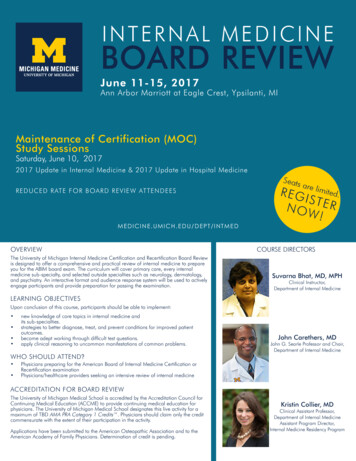
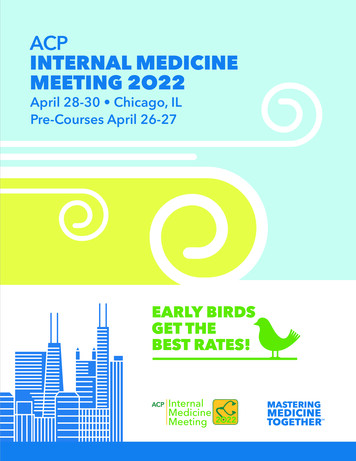
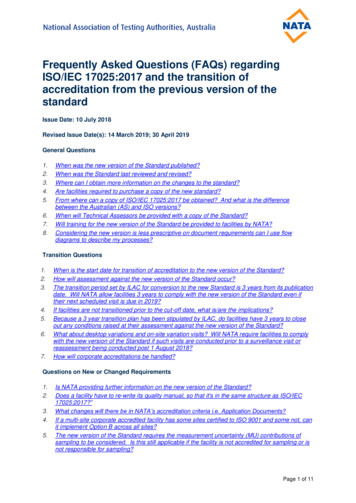
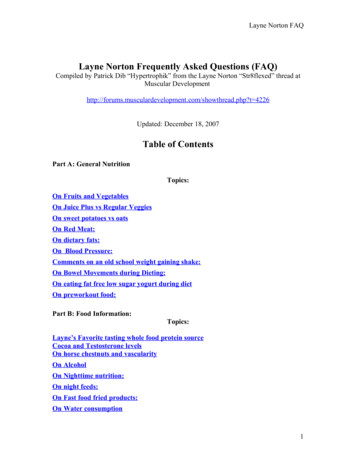
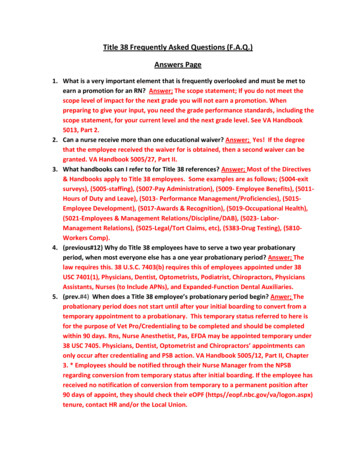
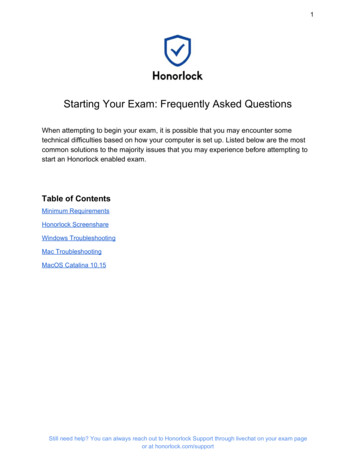
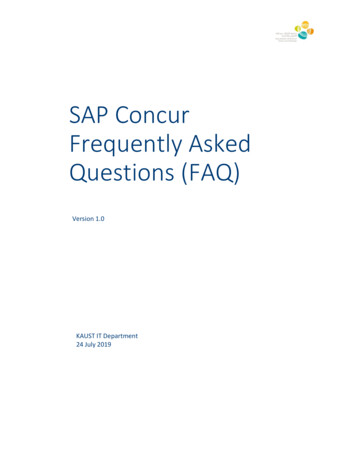
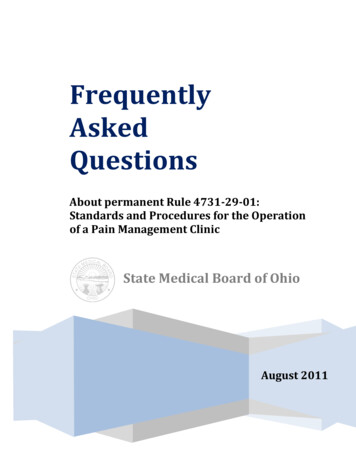
![Informatica Interview Questions and Answers [Scenario-Based]](/img/2/informatica-interview-questions-and-answers-scenario-based-1.jpg)
